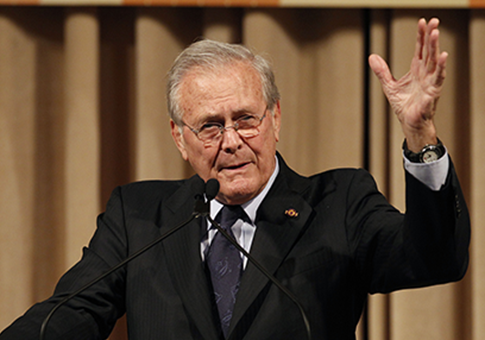Donald Rumsfeld suggested Thursday that members of President Barack Obama’s administration should consider adopting some of the leadership rules contained in his new book.
Rumsfeld discussed the book, Rumsfeld’s Rules: Leadership Lessons in Business, Politics, War, and Life, in a talk at the Heritage Foundation.
The book by the two-time secretary of defense features a collection of almost 400 aphorisms chronicled from his career as a naval aviator, White House staffer, and corporate executive.
Rumsfeld attributed the White House’s struggles to deal with a "perfect storm" of controversies—the shifting account of the embassy attack in Benghazi, heightened scrutiny of conservative groups by the IRS, and the seizure of Associated Press phone records by the Justice Department—to a lack of decisiveness among those in Obama’s administration.
"Make a decision as early as you can, because every day someone either above or below you is limiting your options," he said. "If decisions are delayed, they start getting debated in the press."
But if action is delayed in favor of more deliberation, administration staffers become less believable, he said.
"Trust leaves on horseback and returns on foot," he said. "It’s easier to lose credibility than it is to restore."
Rumsfeld originally recorded the rules on three-by-five notecards and kept them in a shoebox, but President Gerald Ford asked him to type them out and distribute them to staffers when he was serving as chief of staff in 1974. Many of the adages do not come from Rumsfeld himself, but from the military officers and politicians he met throughout his career.
He recounted meeting former British Prime Minister Margaret Thatcher in the early ’80s after President Ronald Reagan asked him to persuade world leaders to oppose the Law of the Sea Treaty.
The treaty, which has not been ratified by the Senate and continues to be debated today, would establish a set of international rules for governing the oceans, including technology and wealth transfers to undeveloped nations and pollution controls.
After describing the treaty’s administration of the rules as "Orwellian" to Thatcher, she replied: "Well, Mr. Ambassador, the way you described it sounds like the international nationalization of two-thirds of the earth’s surface. You know what I think of nationalization."
Rumsfeld also discussed his second stint as secretary of defense during George W. Bush’s presidency, pushing back against the notion that the 9/11 attacks inhibited the "goal of bringing the Pentagon to the 21st century."
"In a strange way it provided an impetus to do things we otherwise probably would not have been able to do," he said.
He noted reforms such as increasing the number of special operations forces by 80 percent as necessary for fighting a different type of enemy in the war on terror. Still, not all of his ideas for reform were met with enthusiasm, he said.
Some Army officers were incensed after his decision to cancel the Crusader artillery program because it was too costly and inefficient, he said.
"There’s enormous resistance in the Iron Triangle—Congress, the Pentagon, and the defense industry—[to change]," he said.
"If you’re going to sin, sin against God; God will forgive you. Never sin against the bureaucracy. They’ll get you one way or another."
The last maxim in Rumsfeld’s book of almost 400 rules?
"If you develop rules, never have more than 10."
